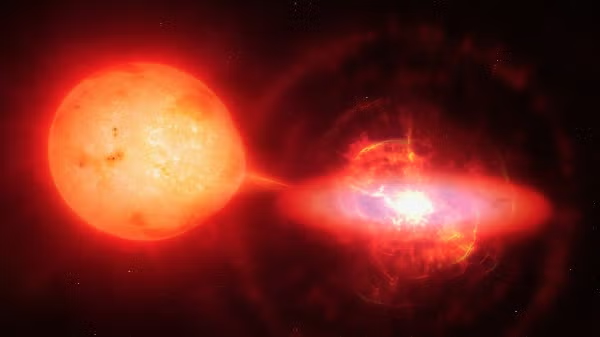Materials science expert joins ASU to solve problems using curiosity, interdisciplinary collaboration

Jason Khoury, assistant professor in the School of Molecular Sciences. Courtesy photo
Jason Khoury, assistant professor in the School of Molecular Sciences and the Navrotsky-Eyring Center for Materials of the Universe, brings a passion for understanding why compounds have specific properties and how to harness that knowledge to design useful materials.
Khoury credits his high-school chemistry teacher with fostering his love for chemistry and research.
“I always knew I wanted to do something in science,” Khoury says, “but I wasn't quite sure what until my senior year in high school. I had a really great high school chemistry teacher, and after going through her class, it made me think ‘maybe I could be a chemistry major and try to do research?’
"I started doing research with my undergraduate advisor, Patrick Woodward, at Ohio State the summer of my junior year, and I found my passion for solid-state chemistry.”
Solid-state chemistry draws on both chemistry and physics, and Khoury is proud of creating his own path between chemistry and physics. At graduate school at Northwestern, his focus was initially synthetic solid-state chemistry, but focused on compounds with properties he found interesting.
“I began asking questions,” Khoury says. “Why did they do what they do? How could we connect structure and function in solid-state compounds? Some of my mentors had warned against going too far into physics, since they saw my interest in solid-state chemistry and thought that my strengths were there. But I always wanted to be more than what I was, to forge my own path that respected the past but looked toward the future.
"I'm so grateful to explore the ideas I have as an assistant professor. I really couldn't have asked for a better job for me.”
As an assistant professor at ASU, Khoury’s lab synthesizes new solid-state materials that have interesting physics, using the language of structure and bonding to understand physical properties. Specifically, Khoury studies materials that have strongly interacting electrons — electrons that "talk" to each other.
“We don't really understand the conditions for this,” Khoury says, “why electrons interact strongly in some compounds but not others. If we can understand the chemistry behind that better, we can make better materials that could be useful in technology, like magnetic data storage, electrical transmission and storage, and MagLev trains.”
While looking ahead to the future, Khoury is grateful for his past. Born and raised in Cleveland, Ohio, his parents immigrated to the United States from Lebanon about a decade prior to his birth.
“My dad was a civil engineer, while my mom stayed home with me and my older brother,” Khoury noted. “I owe them everything, from my work ethic to my interest in science.”
A strong work ethic and value for people are fundamental to Khoury’s success.
“More than anything I hope to be remembered for creating a healthy environment where my lab members learned how to be good scientists and people. I want my lab members to be successful, personally and professionally, and if there's anything I can do to help them, that's what I'll do," he says.
"I think your legacy is not the number of papers, patents or book chapters you write, but the people that learn from you and go out to do great things in the world. If I could make science better by helping to train others to be great scientists, I'd be incredibly grateful.”
More Science and technology

A spectacular celestial event: Nova explosion in Northern Crown constellation expected within 18 months
Within the next year to 18 months, stargazers around the world will witness a dazzling celestial event as a “new” star appears in the constellation Corona Borealis, also known as the Northern Crown.…

ASU researcher points to fingerprints as a new way to detect drug use
Collecting urine samples, blood or hair are currently the most common ways to detect drug use, but Arizona State University researcher Min Jang may have discovered something better.Fingerprints…

Learn about the secrets of forensic science straight from the experts
Over the next week, true crime enthusiasts will have a rare opportunity to discover the secrets of forensic science as experts share techniques for tracking down criminals.Behind Crime Scene…

